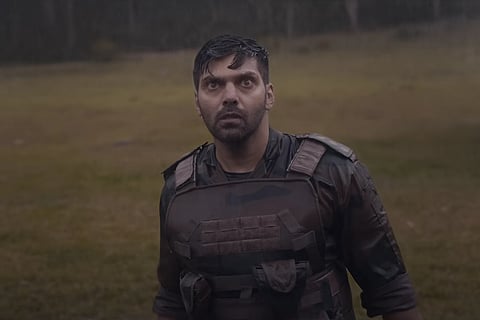

There is something to be said about director Shakti Soundar Rajan’s obsession with making the ‘first’ movie of its kind in Tamil cinema. His last outing Teddy was the “first Tamil film to use an Indian animation company to design a special animated character”. But while his previous experiments sound more impressive on paper – the first Tamil film to feature a dog as the main character; the first Tamil zombie film; and the first Tamil space film – they were quite disappointing in execution. In this grand line comes Captain, which I suppose one can call “the first Tamil film to liberally copy from Predator and other Hollywood movies and make a mess of it even then”.
Captain features a wooden Arya playing Vetri, an Indian Army captain who is posted in a ‘north east’ border town. Though the entire film is set in the ‘north east’, we are never told in which state the action unfolds. We don’t see a single northeastern person in the film either. Maybe Captain can also call itself “the first Tamil film to be set in the north east but without anything to do with the north east”.
Arya is introduced as the dynamic captain in the middle of an Army operation. But the writing is so imitative and unconvincing that you don’t feel any tension over what’s happening (other than a mild concern about having to sit through this for two hours, that is). “There are five stages in a military operation,” Vetri says, and goes on to list them in a deadpan voice, as he takes down people one can only assume are terrorists.
Vetri’s squad is composed of one woman and four men, including him. Before you can register their names or absorb the seriousness of their profession though, the film cuts to a “campus” style song that underscores their friendship and bonding. This is a consistent problem with Shakti’s films; he always picks complex themes and ‘Hollywood’ ideas, but reduces them to the level of a school play with juvenile writing.
As is only to be expected, Vetri’s squad is called in for an important mission. In the forest of this unnamed ‘north east’ town – called Sector 42 – there exists a dangerous creature that has already killed an army squad sent to scout the area. This creature was already featured prominently in the film’s trailer, so there is no shock value when it shows up. The VFX is mediocre, and the ‘predator’, dubbed “minotaur” because of its supposed resemblance to the Greek mythological creature (“giant beetle” would have been more appropriate), never for a moment looks like a real threat.
D Imman’s background score valiantly tries to add some suspense. But with the hopeless acting and unoriginal screenplay, it is a lost battle. The characters seem more suited to a ‘90s college campus film – going by the standard of the jokes they crack – than an army action film. A strong sense of déjà vu pervades the film throughout, and it is difficult to be drawn into it when the main protagonist – Vetri – is expressionless, and just reads books on warfare all day with the camera helpfully focusing on the book covers.
Simran plays Dr Keerthi, and the actor does what she can in a badly written role, looking stern and suspicious in turn. Aishwarya Lekshmi comes and goes as the ‘love interest’, hardly appearing in two scenes and a song. The actor who plays the gruff Army General gets the worst of the writing, as he walks up and down the Army camp looking more and more clueless in every scene.
You can spot where the wires have been erased in the action scenes, and this clumsiness in execution doesn’t help Captain. The film is just under two hours long, but it feels like an age by the time it comes to an end. There are several loopholes in the plot – for example, when Vetri and his squad meet the predator for the first time and fall unconscious, who retrieves them and takes them to the hospital? How come the predator didn’t attack the team that rescued them? Or did they just drive themselves to the camp despite all of them getting shot? For a while, my mind was abuzz with such questions. But then, I decided to just relax and let the film play out. After all, this isn’t the “first Tamil film I was watching where most things didn’t make sense”.
Disclaimer: This review was not paid for or commissioned by anyone associated with the film. Neither TNM nor any of its reviewers have any sort of business relationship with the film's producers or any other members of its cast and crew.
Sowmya Rajendran writes on gender, culture and cinema. She has written over 25 books, including a nonfiction book on gender for adolescents. She was awarded the Sahitya Akademi’s Bal Sahitya Puraskar for her novel Mayil Will Not Be Quiet in 2015.